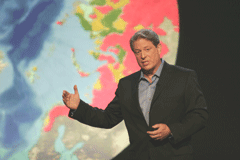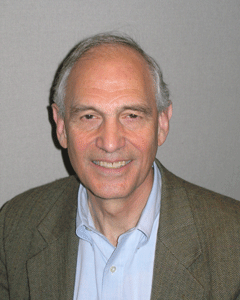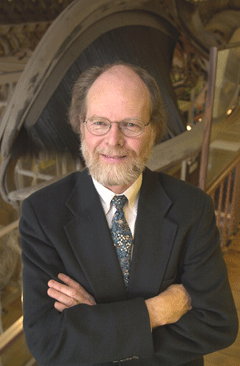Nobel Peace Prize Goes Green
Air Date: Week of October 12, 2007

(Photo: Eric Lee, Copyright © 2006 by Paramount Classics)
The Intergovernmental Panel on Climate Change (IPCC) and Al Gore have won the Nobel Peace Prize for their efforts to shed light on the threat of human-induced climate change to the planet. Host Steve Curwood speaks with Harvard University Professor James McCarthy who chaired part of the third assessment of the IPCC.
Transcript
CURWOOD: From the Jennifer and Ted Stanley Studios in Somerville, Massachusetts, this is Living on Earth. I’m Steve Curwood.
GORE: It’s a moral issue; it’s an ethical issue; it’s almost a spiritual issue because it affects our survival. Who are we? What is our moral responsibility to those who come after us?
CURWOOD: Former Vice President Al Gore speaking about the issue that has come to define his career—at least so far—global warming. Mr. Gore and the IPCC, the Intergovernmental Panel on Climate Change are sharing the 2007 Nobel Peace Prize for their efforts to sound the alarm about global warming. The worldwide acclaim and response to “An Inconvenient Truth,” Mr. Gore’s Oscar-wining call to arms on climate change, may well have accomplished what he could not do as Vice President.
GORE: I tried my best and I learned in the process that the opposition to the kind of dramatic changes that are needed is so deep and so ingrained that it may well be that the only way to bring about the kind of policy changes that are needed is to first of all bring about the changes in public opinion that make it possible for political leaders in both parties to do what's necessary.
CURWOOD: And change public opinion Al Gore has, as have his co-winners—the thousands of scientists of the IPCC who became an official UN body during the first Bush administration. Tufts University Professor and IPPC author Bill Moomaw:

Bill Moomaw is a professor of international environmental policy at Tufts University and a lead author of several IPCC papers. (Photo: Ian Gray)
CURWOOD: But it turns out that the IPCC has become one of the strongest voices of concern. James McCarthy is a Harvard University professor who chaired part of the third IPPC assessment, and he joins me on the line. Hi, Professor.
MCCARTHY: Hello, Steve.
CURWOOD: So the IPCC, this is an organization—congratulations to you, you’ve been a part of this since 1990—what exactly does it do?
MCCARTHY: Well the IPCC brought together—for the first time in the late 80’s, and then for the fourth time just most recently this year in 2007—groups of scientists from around the world to bring the very best understanding of climate change into a single compilation that can be widely distributed and used by policy makers.
CURWOOD: And why do you think the organization has won the Nobel Peace Prize? Why is it sharing the prize for peace?
MCCARTHY: Well, who knows? It’s a very good question. I always look to the signaling of particular organizations with prizes like the Nobel Peace Prize as having had an important contribution. Those of us who have worked on this over the years certainly hope that was the case. But I think it probably is because, as this process has gone through its fourth iteration now, just recently completed its fourth assessment, it is increasingly difficult for anyone to say that there is any body of science that would refute the consensus statements of this organization: that climate change is unequivocal, the odds are nine out of ten, it’s being caused by humans, and the impacts will be widely felt on societies and on natural systems throughout the globe.

James McCarthy is the Alexander Agassiz Professor of Biological Oceanography at Harvard University and former co-chair of the IPCC's Working Group II of the Third Assessment Report. (Courtesy of Harvard Medical School)
MCCARTHY: Well I don’t know that there’s one. When it began, there really was a legitimate debate as to whether the earth was warming in an unusual way. Then when that was settled, the debate was as to whether humans had anything to do with it and if so, how much? And then the question was, well, so what? Will this really have any significant effects? And I think in each case the IPCC has brought clarity to the scientific message.
CURWOOD: At the end of the day, the peace prize has been shared by a number of institutions and persons—everyone from Martin Luther King, Wangari Maathai, the American Friends Service Committee, the International Atomic Energy Agency, and there’s often a political message here. We remember back to when the two Israeli leaders and the Egyptian leader were given the peace prize. Could this prize be a wish being expressed, a desire for some action to be taken by the part of the committee or is this a retrospective award?
MCCARTHY: It certainly, in my estimation, wouldn’t be a retrospective award because what the bodies such as the IPCC and I think, for much of his professional life, Mr. Gore have argued, is not only that we must look at the science but that we must use this information. And so far, it would be fair to say, that the world has not done a very good job of using this information. So in a sense, the peace that we would hope to come from this sort of action, which I think must be in the minds of the Nobel committee, that is to say, there is just little question, that a warmer world, is one in which there will be more conflict. There will be shortages of water, shortages of food, there will be regional strife, civil unrest.

Al Gore in "An Inconvenient Truth" (Photo: Eric Lee, Copyright © 2006 by Paramount Classics)
CURWOOD: If the Nobel committee is hoping to prompt action with this—what is the action they are hoping Mr. Gore will take upon winning this prize?
MCCARTHY: Ha ha. Well, I think to bring just higher visibility to his message and to encourage him, as he has done so successfully, to be the ambassador in political circles where few scientists have the opportunity to speak. And Mr. Gore has been a superb spokesperson for the science to influence world leaders, all nations, that we must work together and take action on this problem.
CURWOOD: Jim McCarthy was the co chair of Working Group II, the third assessment of the Intergovernmental Panel on Climate Change, winners this year of the 2007 Nobel Peace Prize, along with former vice president Al Gore. Professor McCarthy, thank you so much.
MCCARTHY: You’re welcome, Steve.
Links
To listen to a special web extra interview with Professor Bill Moomaw click here.
Living on Earth wants to hear from you!
Living on Earth
62 Calef Highway, Suite 212
Lee, NH 03861
Telephone: 617-287-4121
E-mail: comments@loe.org
Newsletter [Click here]
Donate to Living on Earth!
Living on Earth is an independent media program and relies entirely on contributions from listeners and institutions supporting public service. Please donate now to preserve an independent environmental voice.
NewsletterLiving on Earth offers a weekly delivery of the show's rundown to your mailbox. Sign up for our newsletter today!
 Sailors For The Sea: Be the change you want to sea.
Sailors For The Sea: Be the change you want to sea.
 The Grantham Foundation for the Protection of the Environment: Committed to protecting and improving the health of the global environment.
The Grantham Foundation for the Protection of the Environment: Committed to protecting and improving the health of the global environment.
 Contribute to Living on Earth and receive, as our gift to you, an archival print of one of Mark Seth Lender's extraordinary wildlife photographs. Follow the link to see Mark's current collection of photographs.
Contribute to Living on Earth and receive, as our gift to you, an archival print of one of Mark Seth Lender's extraordinary wildlife photographs. Follow the link to see Mark's current collection of photographs.
 Buy a signed copy of Mark Seth Lender's book Smeagull the Seagull & support Living on Earth
Buy a signed copy of Mark Seth Lender's book Smeagull the Seagull & support Living on Earth

